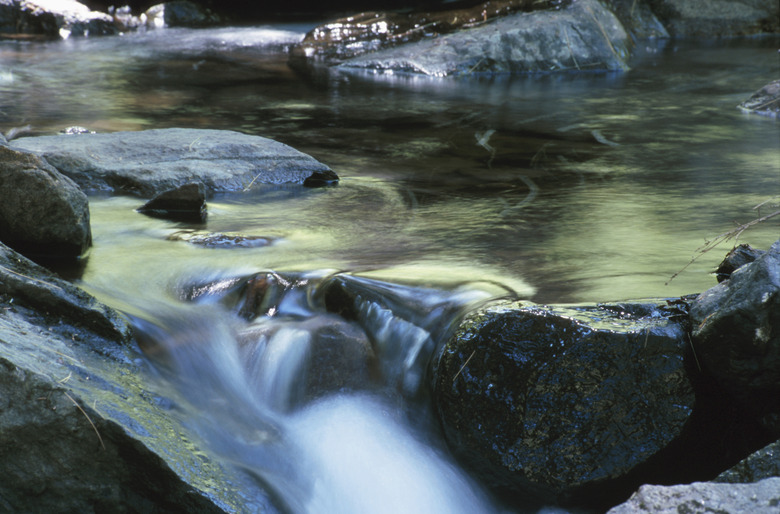Plants & Animals That Live In Rivers & Streams
The Earth's rivers, lakes and streams are home to a wide variety of different freshwater animals and plants. A single aquatic ecosystem can support hundreds of different species, and different freshwater ecosystems exist around the globe. North American rivers and streams in particular feature their own unique animal species and ecology.
The Freshwater Food Web
The Freshwater Food Web
Food webs and food chains are similar in concept, but food webs better describe the many different interactions that happen in an ecosystem. A food web shows all of the food chains within an ecosystem, and therefore all of the different species interactions that occur instead of just following a single energy pathway.
As an example, a food chain describing freshwater animals and plants might list the river otter, then the snake, the fish, the frog and finally, the insect. However, this isn't an accurate portrait of how predator-prey interactions actually happen in an ecosystem!
Sure, the otter eats the snake, but it also feeds on fish, frogs and even insects as well. Food webs correctly describe how all of these river creatures interact in more complex ways than a simple food chain; this model more accurately represents a true ecosystem.
River Animals: Keystone Species
River Animals: Keystone Species
Certain species in an ecosystem majorly impact the rest of the system around them. Scientists call these animals _keystone species_. Keystone species impact other plants and animal species in their environment, causing a trickle-down effect on the rest of the ecosystem. One fantastic example is the beaver.
Beavers and their dams heavily impact the entire ecosystem around them; in fact, beavers can actually create new ecosystems. Beaver dams, and the resulting flooded areas they create, provide wetland habitats that otherwise wouldn't exist. These wetlands allow numerous freshwater plants to grow. In fact, research shows that beavers can increase the plant diversity in an area by 33%. These plants provide shelter for insects, crustaceans, amphibians and small fish. All of those river animals provide important food for other river creatures such as birds, snakes, larger fish, river otters and more.
River Otters: Top Predators and Keystone Species
River Otters: Top Predators and Keystone Species
North American river otters also make a great example of a keystone species. As one of the top predators in their ecosystem, river otters impact the entire freshwater system around them in a positive fashion and help scientists identify whether an ecosystem is healthy or not.
Healthy ecosystems with clean water to support freshwater animals and plants can provide enough food for otters to survive. Polluted systems impact all of the river creatures within them and cannot support otters. Thus, a healthy river not only has otters, but fish and other freshwater animals and plants.
Without otters in the ecosystem, the rest of the river suffers. If the populations of larger fish that the otters prey on grow unchecked, these fish will begin to consume all of the smaller prey in the region. This will cause the ecosystem to fall out of balance, causing population collapse.
River Animals: Freshwater Prey
River Animals: Freshwater Prey
Predators wouldn't survive without prey, and freshwater systems support a range of different river creatures for otters, alligators, snakes, turtles, birds and large fish to hunt. Various smaller fish species, and the young of other large fish species, provide food for all the aforementioned predators. Additionally, many of these predators hunt each other. Other common prey species include frogs, crayfish and other invertebrates.
Creating Habitat: Plants That Live in Freshwater
Creating Habitat: Plants That Live in Freshwater
Plants that live in freshwater provide habitat and food to a wide variety of river animals. You can find some freshwater plant species growing along the water's edge, such as cattails. Other plants grow along the surface of the water, such as water lilies and duckweed.
Fish like to hide in the safety of the shadows created by these plants. In fact, some wading birds even create shady areas using their wings to lure fish into the "safety" of cover before skillfully snatching them from the water. This hunting method is known as _canopy feeding_.
References
- National Geographic: Keystone Species
- National Wildlife Federation: North American River Otter
- Parks Canada: Beavers: 5 Ways Beavers Keep Our Ecosystems Healthy
- SentinelSource.com: Otters Play a Vital Role in Ecology of Rivers
- UC Santa Barbara: Kids Do Ecology – Freshwater
- HeronConservation: Black Heron
Cite This Article
MLA
Zinni, Yasmin. "Plants & Animals That Live In Rivers & Streams" sciencing.com, https://www.sciencing.com/plants-animals-that-live-in-rivers-streams-13427954/. 30 September 2021.
APA
Zinni, Yasmin. (2021, September 30). Plants & Animals That Live In Rivers & Streams. sciencing.com. Retrieved from https://www.sciencing.com/plants-animals-that-live-in-rivers-streams-13427954/
Chicago
Zinni, Yasmin. Plants & Animals That Live In Rivers & Streams last modified August 30, 2022. https://www.sciencing.com/plants-animals-that-live-in-rivers-streams-13427954/
